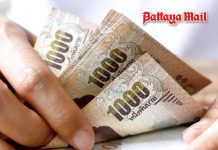BANGKOK, Nov 18 – Thailand will encounter a disappointing economic growth of only 3 per cent this year, a drop from an earlier projection at an already-low 3.8-4.3 per cent, the National Economic and Social Development Board (NESDB) announced today.
NESDB Secretary General Arkhom Termpittayapaisith said the country’s exports and auto manufacturing expanded less than forecast while the state’s investment plan failed to reach its target, floods affected the economy and exports in US dollar terms were stagnant.

He said domestic consumption increased by 0.8 per cent, investment by 0.9 per cent whereas inflation was at 2.4 per cent and current account suffered a deficit at 0.9 per cent of gross domestic product.
He said the political demonstrations have hardly given a negative impact to tourism as tourists mostly travel directly to their upcountry destinations including Chiang Mai, Phuket and Hat Yai.
The number of those travelling to Bangkok is small compared to the major attractions, he said.
Mr Arkhom predicted a 2.7 per cent economic growth in Q3, lower than 2.9 per cent in Q2 while exports shrank by 1.8 per cent at a total value of US$57.964 billion due to a weakened global economy which has an impact on exports across the region.
Investment dropped by 6.5 per cent in line with reductions in state investment by 16.2 per cent, private investment by 3.3 per cent and household spending by 1.2 per cent.
All these factors resulted in Thailand’s economic growth at 3.7 per cent in the first nine months of this year, he said.
The NESDB predicted an economic growth at 4.0-5.0 per cent next year with expansions in exports at 7 per cent and household consumption and investment at 2.7 per cent.
Mr Arkhom said the major driving forces for next year’s economy will be the state investment especially the Bt2 trillion spending on infrastructure development, strengthened global economy which will possibly expand by 3.5 per cent from this year’s 2.9 per cent.
Risk factors for next year include lower-than-projected exports and disappointing expansions of household spending and private investment, he added.




